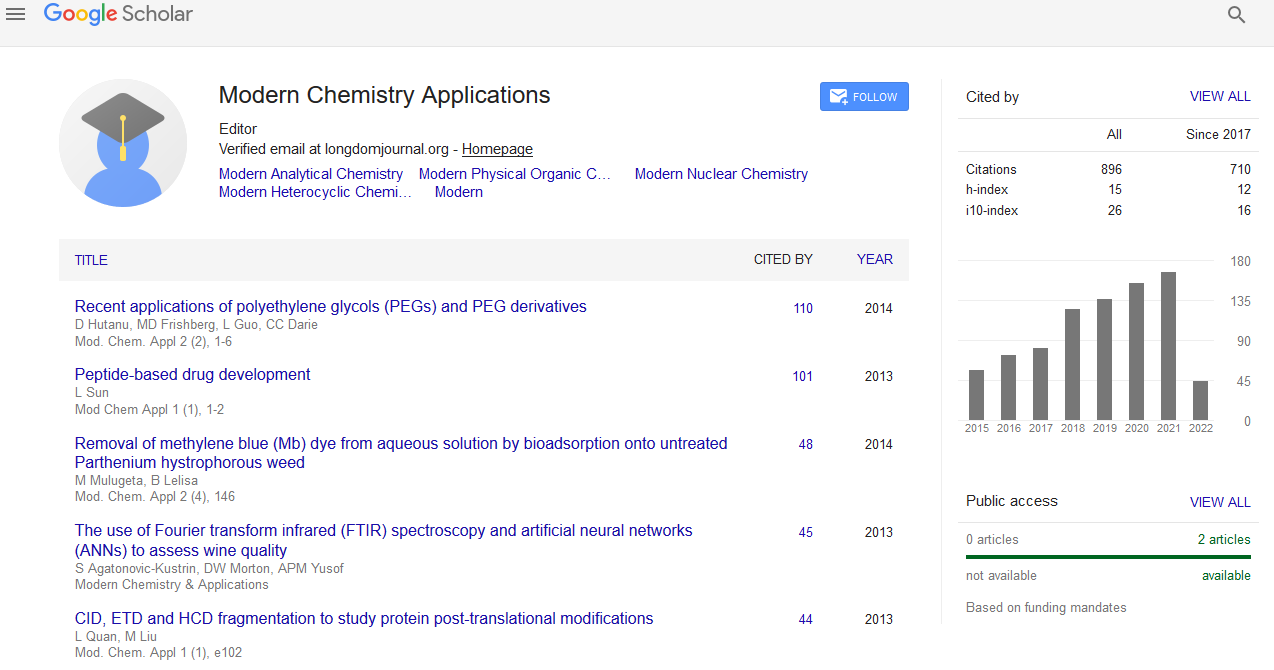Indexed In
- Open J Gate
- JournalTOCs
- RefSeek
- Hamdard University
- EBSCO A-Z
- OCLC- WorldCat
- Scholarsteer
- Publons
- Geneva Foundation for Medical Education and Research
- Google Scholar
Useful Links
Share This Page
Journal Flyer

Open Access Journals
- Agri and Aquaculture
- Biochemistry
- Bioinformatics & Systems Biology
- Business & Management
- Chemistry
- Clinical Sciences
- Engineering
- Food & Nutrition
- General Science
- Genetics & Molecular Biology
- Immunology & Microbiology
- Medical Sciences
- Neuroscience & Psychology
- Nursing & Health Care
- Pharmaceutical Sciences
Elaboration of biodegradable PEGylated nanoparticles made of -amino acid based “pseudo-proteins”
10th International Conference on Chemistry
May 09-10, 2019 | Amsterdam, Netherlands
Temur Kantaria,Tengiz Kantaria, Sophio Kobauri, David Tugushi and Ramaz Katsarava
Kakha Bendukidze University Campus, Georgia
Posters & Accepted Abstracts: Mod Chem Appl
Abstract:
The elaboration of nano- and microscale drug delivery systems is a topical issue today since the selective (targeted) drug delivery is one of the basic problems of modern drug therapy. The important technological advantages of polymeric NPs usage as drug carriers are their high stability, high carrier capacity, feasibility of encapsulation of both hydrophilic or hydrophobic substances, as well as a high variety of possible administration routes. One of the most promising for the design of NPs are α-amino acid-based biodegradable polymers, called as “pseudoproteins”, because they can be cleared from the body after the fulfilment of their function. One of the most promising representatives of the pseudo-proteins are poly(ester amide)s (PEAs) composed of non-toxic building blocks like fatty diols and dicarboxylic acids along with α-amino acids. In our previous study, we have reported a systematic study for the preparation of biodegradable NPs by nanoprecipitation method using PEAs. The present work deals with the fabrication of the surface modified biodegradable NPs that includes the PEGylation (coating NPs with polyethylene glycol cloud) and imparting positive charge to NP’s. The PEGylation of NPs is important for improving their stability against immune system, whereas positive surface charge is important for enhancing permeability through the biological barriers. The PEA 8L6 composed of L-leucine (L), 1,6-hexanediol (6) and sebacic acid (8) was used as a basic polymer for fabricating the NPs. An originally designed comb-like co-PEA, containing lateral PEG-2000 chains along with 8L6 anchoring fragments (8L6-PEG), was used as a PEGylating surfactant.
Biography :
Temur Kantaria is currently a Post-doctoral Researcher at Agricultural University of Georgia. He obtained his PhD in Chemistry from Agricultural University of Georgia and Free University of Tbilisi in 2018. He has published five scientific papers and 25 conference papers. He has his expertise in the preparation and characterization of nanoparticles on the basis of amino acid based biodegradable poly(ester urea)s (MS thesis, 2015, Georgian Technical University); and in the preparation, surface modification and characterization of new biodegradable nano- and microparticles on the basis of pseudo-proteins - poly(ester amide)s and poly(ester urea)s (PhD thesis, 2018).
E-mail: tkant2015@agruni.edu.ge


